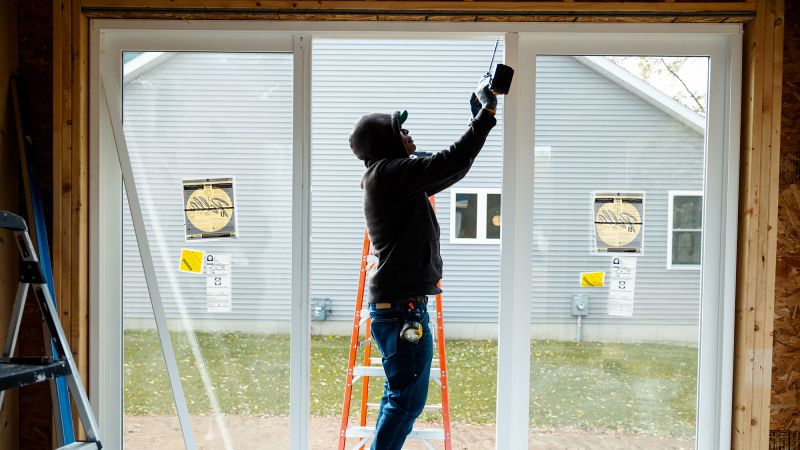A version of this story first appeared in CNN Business’ Before the Bell newsletter. Not a subscriber? You can sign up right here. You can listen to an audio version of the newsletter by clicking the same link. Before the Bell is taking a break for the Thanksgiving holiday and will return on Monday, November 27.
For over a year, the red-hot housing market has been at the mercy of the Federal Reserve’s rate hikes, which have driven mortgage rates to sky-high levels. That pressure could soon ease.
Mortgage rates have hovered above 7% since August, according to Freddie Mac data. Homeowners who locked down ultra-low rates during the height of the Covid pandemic have been reluctant to sell, squeezing the supply of houses available for sale. Both those factors have helped create a scorching-hot housing market and a boom in homebuilder stocks, as Americans turned to building as a buying alternative.
The SPDR S&P Homebuilders exchange-traded fund has popped 35% this year, outpacing the benchmark index’s 17% gain. Shares of PulteGroup have soared 91%, Toll Brothers has risen 71%, DR Horton has added 43% and Lennar has gained 40%.
This week, the Consumer Price Index and Producer Price Index reports for October both signaled that inflation is continuing to slow, cementing investors’ belief that the Federal Reserve is done with its aggressive hiking cycle and will start cutting rates next year.
Stocks and bonds have rallied furiously in response. The 10-year US Treasury yield, which underpins the borrowing cost for everything from student loans to commercial paper to mortgages, slid to 4.45% on Wednesday, well below the 5% level it topped in late October, according to Tradeweb.
Moderating bond yields could change the narrative for the housing market.
Tight supply and elevated mortgage rates this year made home purchases the least affordable they’ve been since 1984. While some prospective buyers have turned to building, not all have been able to make that pivot, as Americans shell out for everything from groceries to restarting student loan payments and rack up credit card debt.
The likelihood that the climb in interest rates, and in turn mortgage rates, is over bodes well for those who have been priced out of the ultra-competitive housing market, says Steve Sosnick, chief strategist at Interactive Brokers.
“The most expensive thing when you’re buying a house is the mortgage, other than the house itself,” said Sosnick. “Anything that can make that cheaper is a plus for the housing market.”
Homebuilder confidence fell in November for the fourth consecutive month, according to the latest National Association of Home Builders / Wells Fargo Housing Market Index, which takes into account current sales, buyer traffic and a six-month outlook for sales of new construction homes. But most of that information was gathered before this week’s inflation data. NAHB forecasts a 5% jump for single-family starts next year.
One possible dark spot in homebuilder stocks’ promising future? If mortgage rates do trickle down, that could entice more owners to put their homes on the market, which could lead more people to buy homes rather than build, says John Petrofsky, senior portfolio manager at FBB Capital Partners.
“Whether the pent up demand is bigger than the pent up supply — I think those are both question marks,” said Petrofsky.
Thousands of Starbucks workers at hundreds of stores went on strike Thursday, as they protested the lack of their first contract despite a nearly two-year-long organizing drive at the coffee chain, report my colleagues Chris Isidore and Danielle Wiener-Bronner.
The strike at Starbucks, which some have dubbed the Red Cup Rebellion, lasted only a day, unlike recent strikes by the United Auto Workers union at the nation’s three unionized automakers or strikes by SAG-AFTRA actors and the Writers Guild of America, which shut down production of many movies and television shows.
But the union said the limited-duration strike on a key promotion day for Starbucks is important in its efforts to win their first contract at the chain. And it is a sign that even with more than 200,000 strikers leaving picket lines in the last month, there are levels of union activism at America’s workplaces that haven’t been seen in decades.
The union, Starbucks Workers United, won its first representation vote at the company in December 2021, at a store in Buffalo, New York. Since then, it has won more votes at 368 other stores out of 454 elections. But there are still no contracts for any of the more than 9,000 union members spread across the stores.
This is the second year in a row that the union has staged widespread walkouts and protests to coincide with the company’s “Red Cup Day” promotion, when it sells its re-usable holiday cups.
Read more here.
Meta will allow political ads on its platforms to question the outcome of the 2020 US presidential election, part of a rollback in election-related content moderation among major social media platforms over the past year ahead of the 2024 US presidential contest, report my colleagues Clare Duffy and Donie O’Sullivan.
The policy means that Meta, the parent company of Facebook and Instagram, will be able to directly profit from political ads that boost false claims about the legitimacy of the 2020 election. While the company will allow political advertisements to claim that past elections, including the 2020 presidential race, were rigged, it will prohibit those that “call into question the legitimacy of an upcoming or ongoing election.”
The change is part of a year-old policy update but has not been widely reported. The Wall Street Journal reported Meta’s ads policy change earlier Wednesday.
Meta says the policy allowing 2020 election denialism in political ads was part of an August 2022 announcement about its approach to last year’s midterm elections, when the company said it would prohibit ads targeting users in the United States, Brazil, Israel and Italy that discourage people from voting, call into question the legitimacy of an upcoming or ongoing election or prematurely claim an election victory.
The same month, Meta told The Washington Post that it would not remove posts from political candidates or regular users that claim voter fraud or that the 2020 election was rigged.
Read more here.
Read the full article here





